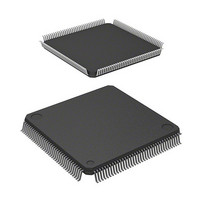R5F61668MZN50FPV Renesas Electronics America, R5F61668MZN50FPV Datasheet - Page 1258

R5F61668MZN50FPV
Manufacturer Part Number
R5F61668MZN50FPV
Description
MCU FLASH 1024K ROM 144-LQFP
Manufacturer
Renesas Electronics America
Series
H8® H8SX/1600r
Datasheet
1.R5F61668MZN50FPV.pdf
(1416 pages)
Specifications of R5F61668MZN50FPV
Core Processor
H8SX
Core Size
16/32-Bit
Speed
50MHz
Connectivity
EBI/EMI, I²C, IrDA, SCI, SmartCard, USB
Peripherals
DMA, LVD, POR, PWM, WDT
Number Of I /o
92
Program Memory Size
1MB (1M x 8)
Program Memory Type
FLASH
Ram Size
56K x 8
Voltage - Supply (vcc/vdd)
3 V ~ 3.6 V
Data Converters
A/D 8x10b; D/A 2x8b
Oscillator Type
External
Operating Temperature
-20°C ~ 75°C
Package / Case
144-LQFP
Lead Free Status / RoHS Status
Lead free / RoHS Compliant
Eeprom Size
-
Available stocks
Company
Part Number
Manufacturer
Quantity
Price
Company:
Part Number:
R5F61668MZN50FPV
Manufacturer:
REA
Quantity:
5
Company:
Part Number:
R5F61668MZN50FPV
Manufacturer:
Renesas Electronics America
Quantity:
10 000
- Current page: 1258 of 1416
- Download datasheet (8Mb)
Section 28 Power-Down Modes
28.8.2
Exit from deep software standby mode is initiated by signals on the external interrupt pins (NMI
and IRQ0-A to IRQ3-A), internal interrupt signals (32K timer, voltage-monitoring interrupt, and
USB suspend/resume), voltage-monitoring interrupt reset, power-on reset, RES pin, or STBY pin.
1. Exit from deep software standby mode by external interrupt pins or internal interrupt signals
2. Exit from deep software standby mode by a voltage-monitoring reset
3. Exit from power-on reset
4. Exit from deep software standby mode by the signal on the RES pin
Rev. 1.00 Jan. 29, 2010 Page 1226 of 1380
REJ09B0596-0100
Deep software standby mode is canceled when any of the DNMIF, DIRQnF (n = 3 to 0),
DT32KIF, DLVDIF, and DUSBIF bits in DPSIFR is set to 1. The DNMIF or DIRQnF (n = 3
to 0) bit is set to 1 when a specified edge is generated in the NMI or IRQ0-A to IRQ3-A pins,
that has been enabled by the DIRQnE (n = 3 to 0) bit in DPSIER. The rising or falling edge of
the signals can be specified with DPSIEGR. The DT32KIF bit is set to 1 when a 32K timer
interrupt occurs. The DLVDIF bit is set to 1when a voltage-monitoring interrupt occurs. The
DUSBIF bit is set to 1 when a USB suspend/resume interrupt occurs.
When deep software standby mode clearing source is generated, internal power supply starts
simultaneously with the start of clock oscillation, and internal reset signal is generated for the
entire LSI. Once the time specified by the WTSTS5 to WTSTS0 bits in DPSWCR has elapsed,
a stable clock signal is being supplied throughout the LSI and the internal reset is cleared.
Deep software standby mode is canceled on clearing of the internal reset, and then the reset
exception handling starts.
When deep software standby mode is canceled by an external interrupt pin or internal interrupt
signal, the DPSRSTF bit in RSTSR is set to 1.
When a voltage monitoring reset is generated by the power-supply voltage falling, the LSI is
released from deep software standby mode and clock oscillation starts. At the same time, a
clock signal is supplied throughout the LSI. When the power-supply voltage has risen
sufficiently, the LSI is released from the voltage-detection reset state. The CPU then starts
reset-exception handling.
When a power-on reset is generated by the power-supply voltage falling, the LSI is released
from deep software standby mode. If the power-supply voltage then rises sufficiently, clock
oscillation starts and the LSI is released from the power-on reset state after the clock
oscillation stabilization time has been secured. As soon as the clock oscillation starts, the clock
signal is provided to the LSI. After that, the CPU starts reset-exception handling.
Exit from Deep Software Standby Mode
Related parts for R5F61668MZN50FPV
Image
Part Number
Description
Manufacturer
Datasheet
Request
R

Part Number:
Description:
KIT STARTER FOR M16C/29
Manufacturer:
Renesas Electronics America
Datasheet:

Part Number:
Description:
KIT STARTER FOR R8C/2D
Manufacturer:
Renesas Electronics America
Datasheet:

Part Number:
Description:
R0K33062P STARTER KIT
Manufacturer:
Renesas Electronics America
Datasheet:

Part Number:
Description:
KIT STARTER FOR R8C/23 E8A
Manufacturer:
Renesas Electronics America
Datasheet:

Part Number:
Description:
KIT STARTER FOR R8C/25
Manufacturer:
Renesas Electronics America
Datasheet:

Part Number:
Description:
KIT STARTER H8S2456 SHARPE DSPLY
Manufacturer:
Renesas Electronics America
Datasheet:

Part Number:
Description:
KIT STARTER FOR R8C38C
Manufacturer:
Renesas Electronics America
Datasheet:

Part Number:
Description:
KIT STARTER FOR R8C35C
Manufacturer:
Renesas Electronics America
Datasheet:

Part Number:
Description:
KIT STARTER FOR R8CL3AC+LCD APPS
Manufacturer:
Renesas Electronics America
Datasheet:

Part Number:
Description:
KIT STARTER FOR RX610
Manufacturer:
Renesas Electronics America
Datasheet:

Part Number:
Description:
KIT STARTER FOR R32C/118
Manufacturer:
Renesas Electronics America
Datasheet:

Part Number:
Description:
KIT DEV RSK-R8C/26-29
Manufacturer:
Renesas Electronics America
Datasheet:

Part Number:
Description:
KIT STARTER FOR SH7124
Manufacturer:
Renesas Electronics America
Datasheet:

Part Number:
Description:
KIT STARTER FOR H8SX/1622
Manufacturer:
Renesas Electronics America
Datasheet:

Part Number:
Description:
KIT DEV FOR SH7203
Manufacturer:
Renesas Electronics America
Datasheet:











